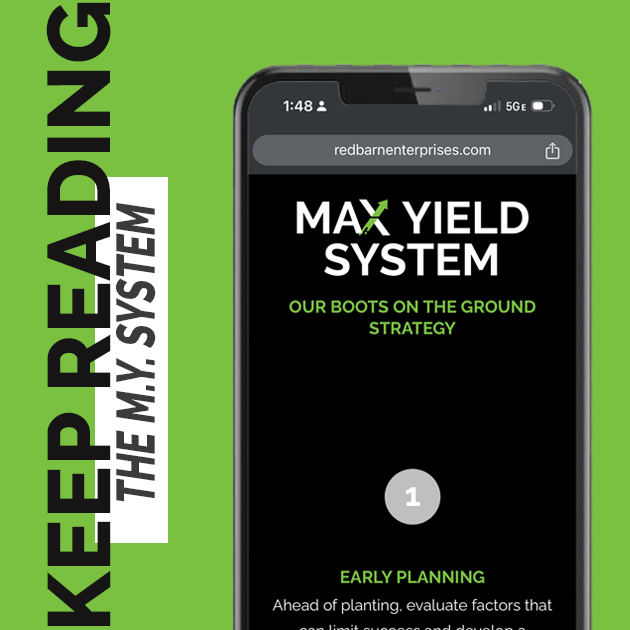
When agricultural consultants consider options for improving yield or addressing a specific pressure, they draw on conventional wisdom, personal experience, and research results. The rapid progression of technology and the knowledge it provides has led to innovative approaches and new products to benefit modern farmers.
What Drives Innovation in Agriculture?
Three things drive innovation in agriculture: specific obstacles that have limited or no current solutions, better responses to known pressures, and environmental or sustainability concerns. These drivers have spurred scientific advances that have deepened our understanding of how crops grow. Chemical and physical properties of soil, the influence of microorganisms in a crop’s rhizosphere, and plant metabolic processes are a few example topics that have provided opportunities to tailor agricultural responses in ways that improve yield, efficiency, and sustainability.
Nutrient Fixation and Soil Properties
Soil characteristics such as pH, pore size, organic matter, and chemical composition directly determine which nutrients are present and how well plants can access them. This is called nutrient fixation. Nutrient fixation is the chemical and physical binding of nutrients within soil. Without conditions to hold them in the soil, nutrients easily leach away. But if they are bound too tightly, plants cannot access the nutrients. The term “fixation” is often used to refer to the latter.
The fixation of different nutrients requires different approaches. For instance, potassium (K) fixation between layers of clay and phosphorus (P) fixation is due to the chemical formation of molecules with minerals like iron, which are bound in different ways. Improving soil structure is likely to help with potassium fixation since the potassium is still in a water-soluble form. However, phosphorus in low pH soils will react with iron to form chemical compounds with very low solubility. Agricultural consultants will need to investigate why a particular nutrient isn’t available before making a recommendation, but due to ongoing research into soil chemistry, products are available to reduce the possibility and effects of nutrient fixation.
Biotechnology and Gene Editing
Biotechnology is based on naturally occurring processes. Using advanced techniques, those processes are altered to produce a specific desired result. Pivot Bio PROVEN 40 is an example of biotechnology that offers an innovative alternative to synthetic nitrogen fertilizer. Pivot Bio selected microbes that already share a mutualistic relationship with corn. Using gene editing, their researchers altered the microbe’s own DNA so that the microbes would provide nitrogen in quantities that helped offset the demands necessary for modern farming. Agricultural consultants have a range of products, including Pivot Bio, to choose from because of how gene editing technology is applied.
Pesticides and Metabolic Support
Research into pesticides and plant metabolism has shown that there are drawbacks even for pesticide-resistant crops. Pesticide tolerance does not mean that the plant can ignore a particular pesticide; the plant metabolizes the pesticide and converts it to a non-toxic form. The plant’s defense response is still triggered, and there are still negative effects on the pesticide-resistant crop.
Metabolizing the pesticide takes a lot of energy. That energy could have been used for additional growth but is wasted on processing the pesticide. Additionally, the pesticide alters the plant’s hormones, further impacting root growth, flowering, and more. Because pesticides remain an important method for protecting crops, innovations include plant growth regulators, hybrid seed development, and biopesticides derived from plants.

Recommendations based on data and advances in agriculture provide modern farmers with maximum yield and return on investment ROI. Targeted and timely approaches like those supported by Red Barn Enterprises balance innovation and reliability. They combine The Max Yield System planning and products they believe in to support farmers. The results are better yields, better profits, and a better world.
Red Barn Enterprises: Agricultural Consultants Looking Out For You
At Red Barn Enterprises, our agricultural consultants are dedicated to providing tailored solutions that address your specific farming needs. With a deep understanding of the latest innovations in agriculture, our experts blend conventional wisdom with cutting-edge technology to maximize your yield and efficiency. We prioritize sustainable practices, ensuring that our recommendations not only boost your productivity but also contribute to long-term soil health and environmental stewardship. Trust Red Barn Enterprises to support your farming endeavors with personalized, data-driven strategies designed to optimize your operations and enhance your profitability.
Getting Started With Red Barn Enterprises
Partnering with Red Barn Enterprises means unlocking an agricultural consultant team of experts with 40+ years of knowledge and experience dedicated to your farm’s success. Our agricultural consultants work closely with you to understand your unique challenges and goals, providing customized solutions that integrate the latest advancements in agriculture. From soil analysis to crop management and biotechnology, we offer comprehensive services designed to maximize your yield and sustainability.
See how a Red Barn agricultural consultant can help you “Farm Differently“
Ready to Start?
See how our innovative approaches and proven strategies can transform your farming operations for a more productive and profitable future!

Leave a Reply